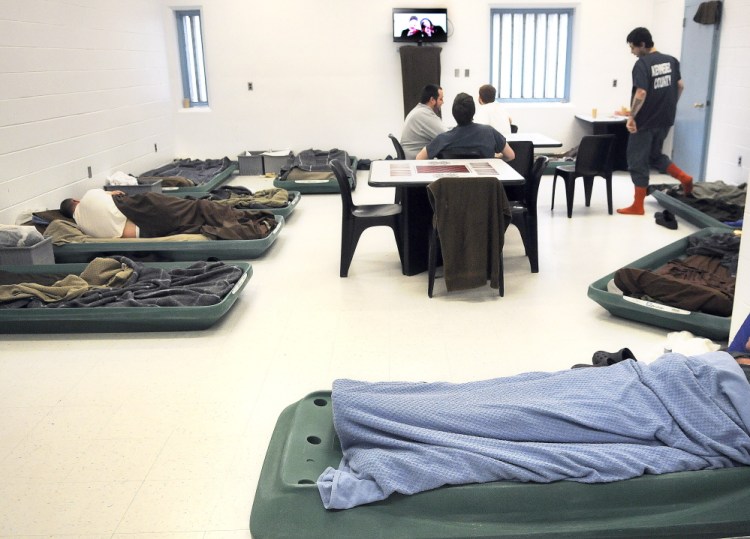AUGUSTA — The Kennebec County sheriff is asking local police departments to forgo making arrests for minor nonviolent offenses because the county jail is chronically overcrowded and faces a potential funding crisis.
The Augusta jail already uses pretrial services and alternative sentencing to ease an inmate population that regularly exceeds the 147 inmates authorized by the state. Many of the inmates held there haven’t been convicted of a crime but are waiting, unable to make bail, for a trial or other disposition of their case.
If municipal police limit the number of arrests they make — people who need to be taken to the Kennebec County Correctional Facility because they can’t pay cash bail — it can help keep the inmate population within acceptable limits, according to Sheriff Randall Liberty.
“We’re just trying to work smarter with the finite resources we have at the correctional facility,” Liberty said.
Liberty said his department’s efforts have paid off so far, reducing the number of inmates booked for misdemeanor offenses by up to 25 percent, though the sheriff didn’t have specific records available to back up the figure.
District Attorney Maeghan Maloney said she supports Liberty’s push to limit the number of pre-trial inmates being housed at the jail.
“It’s always best for a person to spend time in jail after they have been convicted of a crime,” Maloney said. “Sometimes I look at a custody case and think, ‘Why was this person arrested?'”
Police are not making unauthorized arrests, Maloney noted, but Liberty’s request is to make officers aware of circumstances in which they could issue a court summons, even though they have the authority to take someone into custody.
“When making those decisions, I hope that public safety is their number one concern,” Maloney said. She added, “If you’re not there, you don’t know all of the circumstances of that incident. That’s why we have to trust our law enforcement officers.”
Even so, there are situations in which officer’s hands are tied — arrest warrants, for example, compel an officer to take someone into custody and to the jail.
Walter McKee, an Augusta defense attorney, said Liberty’s effort is welcome news.
“This is definitely an idea whose time has come,” McKee said. “The jails are all too full of people that are accused of minor crimes who would not be in jail if they were convicted.”
Some local municipal police officials, though, say officers already are using their discretion and have local priorities that sometimes require officers make an arrest. Sometimes local concerns trump the county’s need to decrease prisoner numbers, police officials said.
“While I understand the sheriff’s request, I’m sure he realizes each community is different and have different priorities,” Waterville Police Chief Joseph Massey said.
Waterville has one of the largest police forces in the county — 31 sworn officers, including Massey and Deputy Chief Charles Rumsey. Out of the 176 arrests made by Waterville police since January, 105 people were transported to the Kennebec or Somerset county jail, according to department figures.
Massey said arrests are sometimes also made to set an example, such as in efforts to curb shoplifting cases and disorderly behavior in the downtown.
Taking a suspect into police custody is sometimes the only way to “send a message” and curb “unacceptable behavior,” Massey said.
JAIL QUESTIONS
Liberty said he started relaying his concerns in November to chiefs of all the police departments in Kennebec County. The conversation became urgent in January, when a funding deficit and political crisis with the Board of Corrections created fear that the Cumberland County Jail would refuse to accept inmates from other counties.
“When all of our inmates are returned and we are unable to secure beds in other facilities, we’ll have to modify the way we are doing business,” Liberty wrote to chiefs in a Feb. 5 email. “We cannot continue to operate in violation of the Department of Corrections mandate of housing a maximum 147 inmates.”
The Kennebec County jail has a peak inmate limit of 161, but it frequently exceeds that ceiling. At one point in January, it was housing more than 200 prisoners, and almost 240 at a time last summer, according to Liberty. Now another 120 inmates are managed by Maine Pretrial Services. Nearly 50 prisoners are housed in other county jails.
The county doesn’t have to pay to house those prisoners, but proposed legislation, L.D. 186, could change that, according to Liberty. The bill, sponsored by Sen. Paul Davis, R-Sangerville, proposes to reverse the consolidated jail system established in 2008 that froze the amount counties pay for their jails. Kennebec County now pays $5.5 million a year and receives about $1.2 million from the state to operate the jail.
During a March 23 public hearing before the legislature’s Committee on Criminal Justice and Public Safety, the Maine County Commissioners’ Association and the Maine Sheriffs’ Association voiced support for Davis’ bill, while expressing concern with some of its wording. Out of 12 groups and people who gave testimony at the hearing, only the Maine Municipal Association and the city of Augusta, represented by Councilor Cecil Munson, spoke in direct opposition to the bill. L.D. 186 is still pending in the committee.
The bill would maintain state funding at the current $12 million, but Kennebec County Administrator Robert Devlin worries that counties might lose that money in the future.
Under the bill, Kennebec County also would have to pay other jails up to $100 per day to house its inmates, Liberty said, adding up to $2 million a year to the jail budget. If state funding is also lost, the county budget could increase by at least 27 percent, Devlin said.
“You really have to ask, do all these people need to be sitting in jail?” he added. “Are they threats to society?”
Arrests should be made to protect public safety or assure an appearance in court, Liberty said.
Limiting arrests for offenses such as violating conditions of release, operating after suspension and shoplifting can make a difference, he added. He has also pushed for departments to time warrant arrests so that inmates only spend a few hours in jail, rather than a few days, before being seen by a judge.
His conversation with the chiefs was intended to draw up some “basic guidelines” focused on the effect increased jail costs might have on property taxpayers.
“It isn’t some arbitrary issue that only affects the region,” Liberty said.
BUSINESS AS USUAL?
Despite Liberty’s request, defense attorney McKee hasn’t seen a change in the number of arrests.
“The jail is still crowded,” he said.
The defense bar has long been concerned with the number of people who are winding up in jail for minor offenses for which a summons would have sufficed, McKee said.
Even a relatively small cash bail, $200 to $300, can be beyond what some people can afford, meaning those people must remain jailed, McKee said. Sometimes, even the $60 fee paid to the bail bondsman is a stretch. That leaves a person to sit in a cell until they can see a judge and can be released on no-cash personal recognizance bail, McKee said.
In many cases, an arrest can lead to bail conditions to prevent violations, or even to update a person’s mugshot, according to Massey, the Waterville police chief.
But Massey still thinks it’s important to make arrests for certain misdemeanor offenses if incidents “happen consistently and happen in an area where it is affecting the quality of life.”
Other times, officers have more serious issues to deal with.
“A lot of time, our supervisors will tell officers, ‘Don’t pick up people who have a warrant on a minor crime. Wait until we’re less busy,'” he said.
Augusta Police Chief Robert Gregoire said Liberty’s request hasn’t changed the way his department operates.
“We are sensitive to his concerns. We have to be,” Gregoire said. He thinks Augusta officers already use their discretion wisely when making arrests for minor offenses, but the city is also facing problems with crime and illegal drugs.
“Unfortunately, that is the state we are in our society. There is just crime, nonstop,” Gregoire said.
In smaller departments, making arrests for minor offenses isn’t seen as a good use of limited resources.
“It’s more or less business as usual,” Clinton Police Chief Craig Johnson said.
With only four full-time officers, often only one officer is on duty at a time, Johnson said. Apprehending a suspect and booking the person at the county jail in Augusta — a 30- to 40-minute drive one way — can keep an officer off the road for hours at a time, he said.
“A trip to Augusta takes a lot of time just being on the road,” Johnson said. In many cases, officers issue a summons to appear in court, or if they have to make an arrest, will try hard to bail the subject out before resorting to a trip to the jail, he said.
Considering the pressure facing the jail, Johnson said he didn’t think Liberty’s request was unreasonable.
“It doesn’t strike me as odd,” Johnson said. “We’ll cooperate with him whenever we can.”
Like Clinton police, Oakland police sometimes have only one officer on duty, usually at night, and an arrest can still take an officer away from the beat for more than an hour, according to Oakland police Sgt. Peter Tibbetts. Oakland officers err on the side of issuing a summons for minor offenses when they can, Tibbetts said.
“There are a lot of things that we can arrest for, by law, that we don’t,” Tibbetts said. “Just because the law says you can doesn’t mean it’s right.”
Peter McGuire — 861-9239
pmcguire@centralmaine.com
Twitter: @PeteL_McGuire
Send questions/comments to the editors.





Comments are no longer available on this story